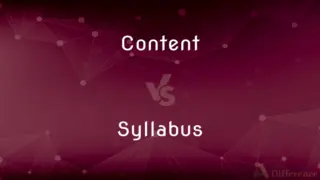Concise vs. Succinct — What's the Difference?
By Tayyaba Rehman — Updated on October 27, 2023
Concise refers to expressing much in few words, while succinct implies clear, precise expression in few words.

Difference Between Concise and Succinct
Table of Contents
ADVERTISEMENT
Key Differences
Concise writing or speech means conveying information effectively using few words without unnecessary details. It focuses on eliminating redundancy and sticking to the point. Succinct, on the other hand, goes a step further, emphasizing clarity and brevity together. It means expressing ideas in a very clear and precise manner, using the fewest words possible.
Conciseness is about removing excess verbiage to make the message more digestible, while succinctness is about precision in expression. A concise statement cuts out extra words; a succinct statement is not only brief but also comprehensively clear.
In a concise statement, the focus is on concision as a means to an end, often for efficiency or clarity. In a succinct statement, brevity and clarity are intrinsically linked. Succinctness carries an element of eloquence in brevity, while conciseness simply refers to being brief.
While both concise and succinct communications are brief and to the point, succinctness demands a level of clarity that concise statements do not necessarily require. Conciseness may sometimes sacrifice detail for brevity, but succinctness does not compromise on clarity despite being brief.
In summary, while concise and succinct are often used interchangeably, succinct carries a connotation of elegance and precision that concise does not.
ADVERTISEMENT
Comparison Chart
Focus
Eliminating redundancy.
Clarity and brevity.
Key Attribute
Briefness.
Clarity in brevity.
Expression
May sacrifice some detail.
Does not compromise on clarity.
Use
General brevity, efficiency.
Precise, clear communication.
Connotation
Simply brief.
Elegantly brief and clear.
Compare with Definitions
Concise
Expresses ideas with no unnecessary words.
His concise instructions were easy to follow.
Succinct
Clearly expresses ideas in few words.
His succinct reply captured the essence of the argument.
Concise
Eliminates redundancy in expression.
He gave a concise summary of the book.
Succinct
Maintains clarity despite brevity.
The instructions were succinct yet comprehensive.
Concise
Condenses information into fewer words.
The guidebook was known for its concise descriptions.
Succinct
Combines brevity with precision.
Her succinct presentation impressed the clients.
Concise
Clear but may sacrifice some details for brevity.
Her concise email saved everyone's time.
Succinct
Elegantly brief without sacrificing clarity.
The poet was admired for her succinct verses.
Concise
Efficiently communicates the essential points.
Her report was concise yet informative.
Succinct
Brief and clear with an elegant touch.
His succinct writing style won accolades.
Concise
Concise is a municipality in the district of Jura-Nord Vaudois in the canton of Vaud in Switzerland.
Succinct
Characterized by clear, precise expression in few words; concise and terse
A succinct reply.
A succinct style.
Concise
Giving a lot of information clearly and in a few words; brief but comprehensive
A concise account of the country's history
Succinct
(Archaic) Encircled as if by a girdle; girded.
Concise
Expressing much in few words; clear and succinct.
Succinct
Brief and to the point.
You should give clear, succinct information to the clients.
Concise
Brief, yet including all important information
Succinct
Compressed into a tiny area.
Unlike general lossless data compression algorithms, succinct data structures retain the ability to use them in-place, without decompressing them first.
Concise
(obsolete) Physically short or truncated
Succinct
(archaic) Wrapped by, or as if by a girdle; closely fitting, wound or wrapped or drawn up tightly.
Concise
To make concise; to abridge or summarize.
Succinct
Girded or tucked up; bound; drawn tightly together.
His habit fit for speed succinct.
Concise
Expressing much in a few words; condensed; brief and compacted; - used of style in writing or speaking.
The concise style, which expresseth not enough, but leaves somewhat to be understood.
Where the author is . . . too brief and concise, amplify a little.
Succinct
Compressed into a narrow compass; brief; concise.
Let all your precepts be succinct and clear.
The shortest and most succinct model that ever grasped all the needs and necessities of mankind.
Concise
Expressing much in few words;
A concise explanation
Succinct
Briefly giving the gist of something;
A short and compendious book
A compact style is brief and pithy
Succinct comparisons
A summary formulation of a wide-ranging subject
Common Curiosities
Is conciseness important in academic writing?
Yes, conciseness helps in presenting ideas clearly and efficiently.
Can a speech be concise but not succinct?
Yes, it can be brief without being precisely clear.
Does concise mean the same as short?
Yes, concise implies being short in length and to the point.
Is succinctness always preferable?
Succinctness is ideal for clear and efficient communication.
Does succinct writing exclude important details?
No, it includes essential details with clarity and brevity.
Does being succinct require a good vocabulary?
A good vocabulary helps in expressing ideas succinctly.
Is being concise beneficial in business communication?
Absolutely, it saves time and conveys messages effectively.
Can succinct communication be misunderstood?
Rarely, as it emphasizes clarity along with brevity.
Can a long document be concise?
Yes, if it's brief relative to the complexity of the topic.
Can a joke be concise and succinct?
Yes, if it's brief and delivers the punchline clearly.
Do concise statements lack detail?
They may omit some details to maintain brevity.
Is succinctness important in public speaking?
Yes, it helps in delivering clear, impactful messages.
Is it challenging to write succinctly?
It can be, as it requires precision and clarity in expression.
Does editing for conciseness improve writing?
Generally, it makes writing more efficient and readable.
Share Your Discovery

Previous Comparison
Content vs. Syllabus
Next Comparison
Occupant vs. TenantAuthor Spotlight
Written by
Tayyaba RehmanTayyaba Rehman is a distinguished writer, currently serving as a primary contributor to askdifference.com. As a researcher in semantics and etymology, Tayyaba's passion for the complexity of languages and their distinctions has found a perfect home on the platform. Tayyaba delves into the intricacies of language, distinguishing between commonly confused words and phrases, thereby providing clarity for readers worldwide.













































